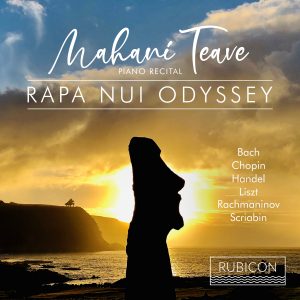
”Perseverance, secret of all triumphs.” Victor Hugo
Determined to play the piano, Mahani Teave was without a key asset: a piano. Despite being 2,000 mile west of the Chilean coastline, the young islander was encouraged by established performer Roberto Bravo, to travel to the mainland for study for six years. Thereafter, she continued her training in the United States and Germany. But at age 30, and after the launch as a successful performer, Mlle Teave wanted to do something vastly different: return to Easter Island to establish a music school aimed at educating young children in the field of music.
Broader exposure to this lovely lady fortuitously occurred when Washingtonian visitors, Dave and Amy Fulton, were pleasantly awarded a stunning performance by Mahani Teave under the roof of Toki Rapa Nui, the music school that, fascinatingly, was made out of recycled garbage. (Yes, Mlle Teave is also an ardent environmentalist and activist!) So impressed by her virtuosity, the Fultons made arrangements for her to visit the Pacific Northwest to record this CD…this isn’t your ordinary “Piano Recital”!! Perhaps being raised on a remote island in the South Pacific brings with it a nuanced suavity. Mahani Teave’s style has a gauzy, breezy trim in the sails.
And while the Rapa Nui native conveys plenty of artistic shading, the outpourings of Classicism remain in tact. While Handel’s Suite is straightforward and academic, more interesting observations can be made about Liszt’s œuvres, particularly during the Ballade which battles between piano passages and that of the tempestuous forte clauses with an unleashing of vibrant strength. Framed by amazing impeccability, this piece seems to have more intimacy with the artist. Similarly, Vallée d’Obermann hangs on a harness of deep gravity, mottled by lighter, cooler transitions. Her interpretation demonstrates her firm control.
Inside the Prelude and Nocturne for the Left Hand Mlle Teave’s treatment of the entire opus is laced with extreme deftness, helping to congeal Scriabin’s true vexations that were rifting away in his right hand. The tempo, politely distanced, allows her performance to permeate the Russian’s mental anguish.
When turning to Chopin, the modicum of reserve reveals itself in the opening Barcarolle: the read has more roundedness, throttling back majestic apexes and even during the closing pages. The ensuing Scherzo has stronger contrasts, whereby the pianist conveys deliberate punctuations and substantive rubato in the opening section.
The concluding “Rapa Nui” is a spacious set of variations based on a traditional island song, exuding gatherings of spiritual hymn. One can’t help but reflect upon Mahani Teave’s roots and look at the juxtaposition of a beautifully trained classical pianist rising above the black rock beaches with extant Moai statues watching over as protectors of one of their own.
What a splendid sendoff.
Christie Grimstad

